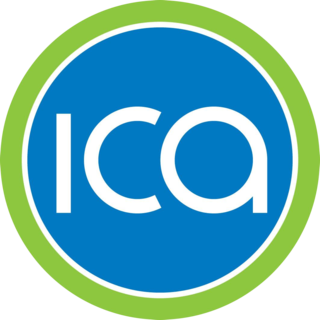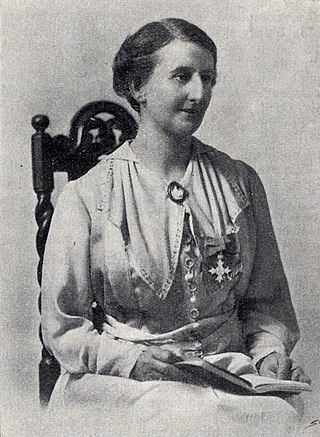Related Research Articles

The National Union of Women Teachers (NUWT) was a trade union representing women schoolteachers in Great Britain. It originated in 1904 as a campaign for equal pay for equal work, and dissolved in 1961, when this was achieved.

Dame Margery Irene Corbett Ashby, was a British suffragist, Liberal politician, feminist and internationalist.

The Irish Countrywomen's Association is the largest women's organisation in Ireland, with 6,100 members. Founded in 1910 as the Society of United Irishwomen, it exists to prove social and educational opportunities for women and to improve the standard of rural and urban life in Ireland. Its central office is in Dublin. It is one of the oldest societies of its kind in the world.
The British Housewives' League is a right-wing, non-party group that seeks to act as the voice of the British housewife, providing advice and encouraging active participation in society. The League seeks to defend the UK's independence and constitution, to promote Christian values, and to discourage excessive state control. In the past the League has campaigned against rationing, identity cards, fluoridation campaigns in the 1950s and UK membership of the European Union.
Feminism has played a major role in shaping the legal and social position of women in present-day Ireland. The role of women has been influenced by numerous legal changes in the second part of the 20th century, especially in the 1970s.
Christiana Hartley was an English social and welfare rights activist, philanthropist and Liberal Party politician.
The National Women's Council of Ireland (NWCI) (Irish: Comhairle Náisiúnta na mBan in Éirinn) is a representative organisation for women and women's groups in Ireland.
The Dublin Women's Suffrage Association (DSWA), later the Irish Women's Suffrage and Local Government Association (IWSLGA), was a women's suffrage organisation based in Dublin from 1876 to 1919, latterly also campaigning for a greater role for women in local government and public affairs.
Helen Sophia Chenevix was an Irish suffragist and trade unionist. In 1911, she worked with Louie Bennett to form the Irish Women's Suffrage Federation. The two later founded the Irish Women Workers' Union.

Clara Dorothea Rackham née Tabor was an English feminist and politician active in the women's suffrage movement, the Women's Co-operative Guild, the peace movement, adult education, family planning and the labour movement. She was a pioneering magistrate, Poor Law Guardian, educator, anti-poverty campaigner and penal reformer in Cambridge where she was a long-serving city and county councillor. Rackham was vice-chairman of Cambridgeshire County Council from 1956 to 1958 and chairman of the Cambridgeshire County Council Education Committee from 1945 to 1957. She first came to prominence through her leading role in the National Union of Women's Suffrage Societies and later became a significant national figure in the labour movement, acquiring a national reputation for her expertise on factory conditions, workers' rights, equal pay, and national insurance.

Wilhelmina Hay Abbott, also known by the name "Elizabeth Abbott," was a Scottish suffragist, editor, and feminist lecturer, and wife of author George Frederick Abbott.
The Neutral Thousands, initialized as TNT, was an organization created in 1937 to target union activities and was known as an anti-union organization. The organization rose along with a tide of similar organizations in the period of the late-19th century to the mid-twentieth century. Bessie Ochs, formerly a speaker for the Merchants and Manufacturers Association, was recruited by Byron C. Hanna, the leader of The Southern Californians, Incorporated, to lead the organization. In addition to the general activities of the organization, it also broadcast a radio program, referred to as the "California Caravan".
Ellice Pilkington was an Irish women's activist and artist.

Rose Finkelstein Norwood was an American labor organizer. During her long career she led labor campaigns for telephone operators, garment and jewelry workers, boiler makers, library staffers, teachers, sales clerks, and laundry workers. She was active in many labor and civil rights organizations, including the Boston Women's Trade Union League, the Women's International League for Peace and Freedom, and the National Association for the Advancement of Colored People. She was a vocal opponent of antisemitism, racism, and fascism, a lifelong supporter of women's rights and workers' education, and an advocate for the elderly.

Laura Annie Willson MBE was an English engineer and suffragette, who was twice imprisoned for her political activities. She was one of the founding members of the Women's Engineering Society and was the first female member of the Federation of House Builders.

Hilda Tweedy, néeAnderson (1911–2005) was an Irish women's rights activist. A founding member and leader of the Irish Housewives' Association (IHA), she was active for decades advocating for the rights of women on a diverse number of issues including equal pay, girls' education, recycling, the marriage bar, the right of women to serve on juries, and other issues.
Maude Rooney was an Irish consumers' and women's rights activist.
Rosaleen Mills was an Irish activist and educator.

Juanita Maxwell Phillips was a politician and activist. She was the first woman to serve on Honiton Borough Council, as mayor of Honiton, and on Devon County Council. As mayor of Honiton, she became the first woman mayor in the West Country. She was named an Officer of the Order of the British Empire in 1950.
Beatrice Dixon was an Irish pioneer of women's participation in public life, and served as the first woman juror in Ireland.
References
- 1 2 3 4 5 Hilda Tweedy obituary, Irish Times, 9 July 2005.
- 1 2 Law, Cheryl (2000). "IHA – Irish Housewives Association". Women, a modern political dictionary . London: Tauris. pp. 169. ISBN 9781860645020 . Retrieved 4 August 2021.
- 1 2 Law, Cheryl (2000). "Tweedy, Hilda". Women, a modern political dictionary . London: Tauris. pp. 149. ISBN 9781860645020 . Retrieved 4 August 2021.
- ↑ Lunney, Linde (2009). "Dixon, Beatrice Maureen". In McGuire, James; Quinn, James (eds.). Dictionary of Irish Biography . Cambridge: Cambridge University Press.
- ↑ de Haan, James (2015). "McQUAID'S 'OLD GRANNY'". History Ireland. 23 (1): 42–44. doi:10.2307/43234641. JSTOR 43234641.